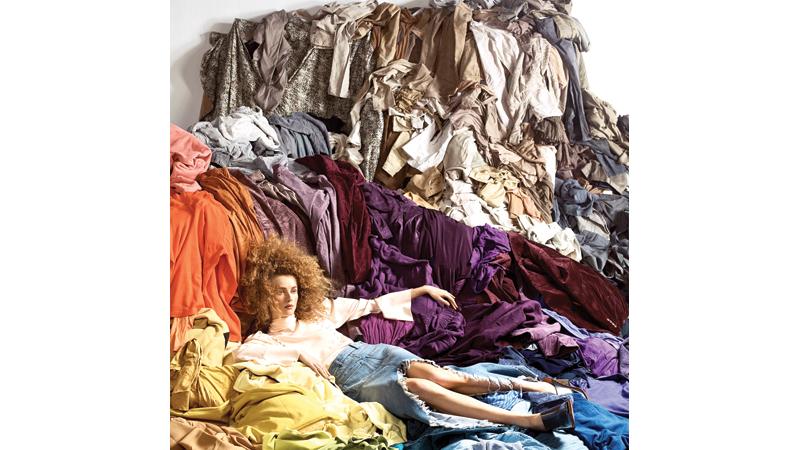
There are many, many ways to do this, across every industry, every issue and everything you normally buy, use or throw away.
You don’t have to make a massive shift with everything you do or buy, all at once (and certainly don’t throw out good stuff for more ‘sustainable’ versions).
To live a more sustainable life, it takes a lifestyle change rather than a crash diet style approach.
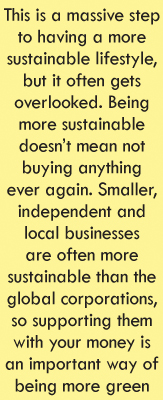 Being more sustainable isn’t an easily achieved goal you can tick off and the move onto the next thing on your list - it’s a lifelong journey, of learning, experimenting, failing, starting again and sharing your adventure.
Being more sustainable isn’t an easily achieved goal you can tick off and the move onto the next thing on your list - it’s a lifelong journey, of learning, experimenting, failing, starting again and sharing your adventure.
The destination may be important for us all to aim for, but the journey - no matter how slow or fast, is the thing that counts.
Tips for sustainable lifestyle:
Reduce your consumption
This is a huge overarching goal. We are consumers, every one of us, but our constant overconsumption of everything from printers we throw away rather than fix, to wear once fast fashion is wrecking our only home. It’s not totally our fault, it’s what we’ve been lead to believe adds up to a happy, successful life, but it’s something more and more of us are realising isn’t right.
The world is drowning in our ‘consumed’ items, from nappies to plastic straws and if you want to be more sustainable - then looking at everything you buy as an eco-friendly decision is an important mindset shift.
You work hard for your money, spend it wisely with brands and services that care about nature and the planet, rather than ones that pile up goods and sell them cheap.
Stopping and questioning what you need - and why you need it, and looking at other alternatives than just going out and buying it straight from Amazon - is the first big step to being more sustainable - and you’ll be surprised how powerful it is. Hey, it often saves you money too.
Support local businesses
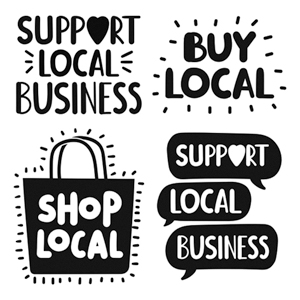
This is a massive step to having a more sustainable lifestyle, but it often gets overlooked. Being more sustainable doesn’t mean not buying anything ever again. Smaller, independent and local businesses are often more sustainable than the global corporations, so supporting them with your money is an important way of being more green.
Investigate the brands you often spend with.
• Do they have a give back or charity partner?
• Do they offset their emissions?
• Are they a social enterprise?
• Do they have an environmental purpose?
These are all simple checks you can do to make sure your money is working hard for the planet.
Local businesses have the added value of keeping money in your local economy and you know you’re supporting real people who are often passionate about their idustry, skill or product.
Zero waste shops are brilliant examples of sustainable, local businesses and have become hubs for lots of sustainable knowledge and expertise in their communitities.
Buy organic
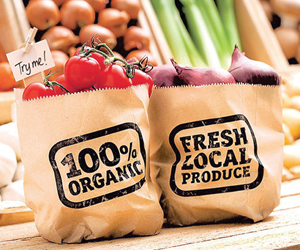 Why buy organic? What difference does it really make? It’s not just the indivduual bar of chocolate or carrots that you choose to buy organic - it’s about valuing the farming system that produced the food you love.
Why buy organic? What difference does it really make? It’s not just the indivduual bar of chocolate or carrots that you choose to buy organic - it’s about valuing the farming system that produced the food you love.
If you think your food should be nutrious, shouldn’t leave the world in a worse place, should treat workers, farmers and factory workers properly, if you respect animal rights, then actually placing a value on that food, aside from the cheap price assigned by the supermarket, then think about buying organic as much as you can.
Organic simply means no chemical fertilisers, no antibiotics and no GM, with animals fed organic food and there’s an emphasis on their welfare.
Buy less, buy better
This really is a mindset change, rather than a quick swap but once you’re in the sustainable groove, it definitely becomes addictive and you’ll feel better about the things you do buy!
We know not buying anything isn’t possible, or even the best course of action as we need more sustainable businesses and products, but thinking carefully about the quality and provenance of everything you’re buying really does make a difference.
To be more sustainable you want to make your stuff last as long as possible, to keep it out of landfill, so you have to replace it less and therefore less needs to be produced in the supply chain.
Every product in your house has a manufacturing carbon footprint and it will end up as waste. It had a life before and after your house, so it’s time to think beyond the bin.
• Can you choose products that can be easily mended or have parts replaced?
• Choose products that have been upcycled from other materials or items?
• Can you choose a recycled version of a new product?
• Make sure what you buy can be recycled?
• Choose materials that won’t break - so a metal colendar over a plastic one for instance. Where you can avoid plastic all together.
Make, mend, sew and share
This really is the other side of the buy less, buy better mentality.
If you want to have a more sustainable lifestyle, then some of that comes down to keeping your posessions, clothes and everything else in circulation longer and valuing them more.
Recycling is the last resort here - much of our recycling doesn’t actually get recycled, and it’s a tiny percentage overall of everything we chuck out.
Plus it’s good for your mental health!
Learn more about the issues you care about
When we’re talking about being more sustainable, that can cover SO many issues - from the fashion industry to industrial farming, permaculture to pioneering bio-tech, so often the first step is actually forgetting about the broad brush of ‘sustainability’ and work out which issues resonate more with you. It could include
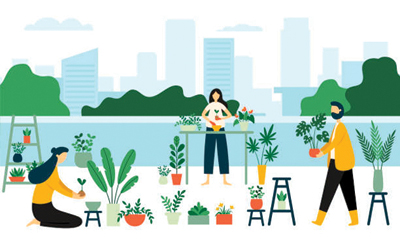 • Going plant based and swapping to vegan skincare and clothing
• Going plant based and swapping to vegan skincare and clothing
• Animal rights and the industrial farming system
• Deforestation and our loss of biodiversity
• Getting rid of plastic in our rivers, seas and oceans
• Reducing the number of chemicals we use in our clothing, skincare and food
• Tackling waste or recycling
• Creating more green spaces in your local area
Use your favourite issue to guide the things you buy, eat, drink and where you shop.
We call this ‘shopping your values’. If a brand, outlet or service doesn’t share your passions and concerns, find someone who does.
Reduce your waste
Now this is another big step on the journey to adopting a more sustainable lifestyle.
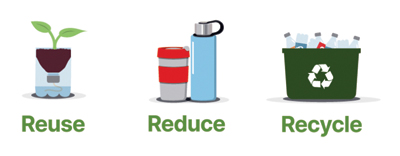 From plastic to food waste, what we throw away is causing huge problems for the planet - plus everything thrown away is a waste of resources, emissions, materials, time and money. It’s the other half of reducing your consumption.
From plastic to food waste, what we throw away is causing huge problems for the planet - plus everything thrown away is a waste of resources, emissions, materials, time and money. It’s the other half of reducing your consumption.
Most of us think of buying something new, using it and then throwing it away as a straight line - whereas for us to use less of our planet’s finite resources we need to be thinking circularlly. This is the circular economy that you might have heard about - using waste products to make new things - and reducing a need for the bin at all.
Reducing your single use plastic waste and your food waste are two massive steps to take to being more sustainable - and will save you money!
Single use plastic waste
Single use plastic is more than just plastic straws and coffee cups, what about your shampoo bottle, packages that come with bubble wrap, chocolate and crisp wrappers? Most single use plastic is not recycled (even if it says it can be) and is either burnt or sent to landfill.
Everyday Plastic has a great weekly plastic waste audit for households to follow to work out what you throw away, and you can work out how to reduce it and swap to non plastic alternatives.
Eat less dairy and meat
Whether you decide to go full vegan, or just want to eat more plant based meals, reducing your intake of dairy and meat goes a long way towards a more sustainable lifestyle.
The stats are frightening.
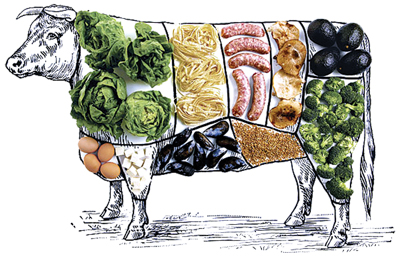
• 4% of the world’s greenhouse gases come from dairy farming (there are around 1 billion cows in the world)
• Dairy cows have short, miserable lives, are often kept in sheds and mistreated
• Dairy farming is one of the biggest sources of water pollution in the UK
• Nearly 60% of the world’s agricultural land is used for beef production
• Animal agriculture needs more land, resources and energy than crops do
• One-third of the world’s grain is used to feed our animal livestock
• Globally, we eat around 50 billion chickens each year
There are a lot more insights and stats on this post by Eco Warrior Princess.
But it’s worth remembering that not all meat and dairy is created equally. Organic and/or sustainable farms or local producers who look after their animals, are often a more sustainable choice than buying an avocado wrapped in plastic that’s been flown in from Mexico.
What you want to avoid is buying products from the global industrial farming industry that have a terrible impact on animal welfare, deforestation, biodiversity loss and soil degradation.
Travel more lightly
While we are all rethinking our travel habits this year, it’s time to think about how your new sustainable lifestyle expands to travel. Being more sustainable when it comes to going on holiday, can take various forms.
• Avoid flying - which is one of the most carbon intensive things you can do. A return flight to New York produces more carbon emissions per person than some people in developing countries get through in a year.
• Embrace slow travel - from taking the train to getting on your bike - take pleasure in not rushing, not doing short haul trips for the ‘gram and enjoying the landscape from a different angle.
• Choose independent or local accomodation, tours, experiences and so on - make sure your hard earned holiday money works hard to support the people who are showing you a good time.
• Donate or give back to conservation or community projects or support travel brands that do that for you.
